Simple search marketing can significantly boost your online visibility without getting overwhelmed by complex strategies. This guide covers straightforward techniques you can use to improve your search engine rankings and drive more traffic to your website.
Key Takeaways
- Search marketing is essential for online visibility, driving traffic and potential sales, with a significant portion of web traffic coming from Google searches.
- Effective SEO involves keyword research, high-quality content creation, and on-page optimization techniques to improve search engine rankings and user experience.
- Paid search advertising and budget management are critical for quick results and maximizing ROI, while integrating mobile optimization and analytics helps refine marketing strategies.
Why Simple Search Marketing Matters
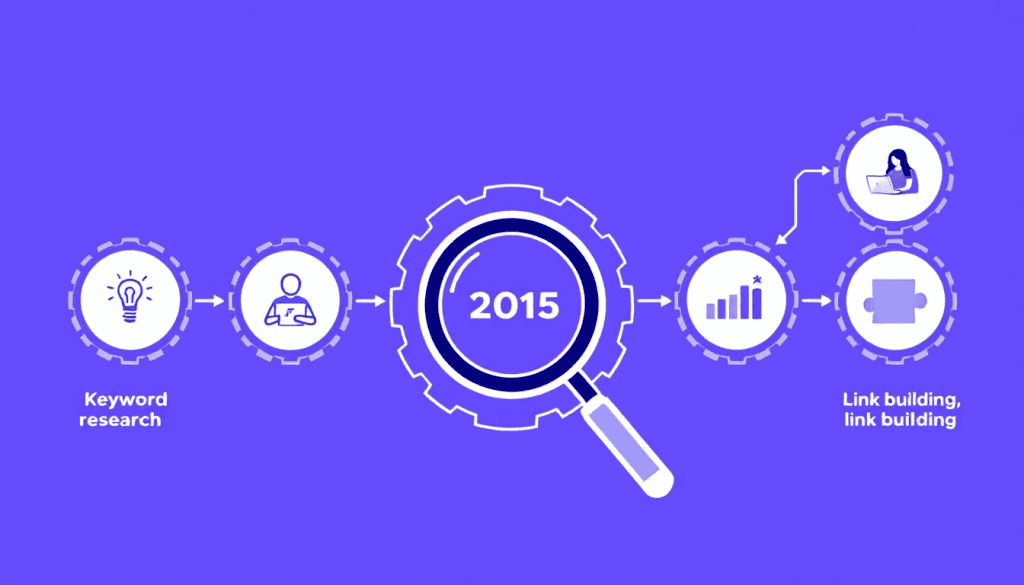
In the realm of digital marketing, search marketing is essential due to billions of searches happening every day. To be noticeable in a densely populated digital market, it’s imperative for businesses to have an effective strategy for search engine results. A strategic approach to these searches can significantly boost a website’s visibility, which may result in heightened traffic and potential increases in sales. Imagine your business’s website ranking at the top of Google’s search results. With around 30% clicks going towards that prime position, it highlights why achieving high rankings is critical.
Considering e-commerce platforms specifically, approximately 65% of their web sessions are driven by search efforts split between organic sources and paid ads. Impressively enough, nearly three-fifths of overall online traffic comes from organic searches on Google alone – illustrating just how vital this channel can be for companies seeking virtual engagement.
Implementing a robust search marketing plan not only boosts your online presence but also propels traffic flow towards your site leading directly into augmented sales figures. Recognizing and capitalizing on the significance that lies within well-crafted strategies related to searching activities becomes pivotal when harnessing its advantages for any commercial venture aiming success through its website.
Understanding SEO Basics
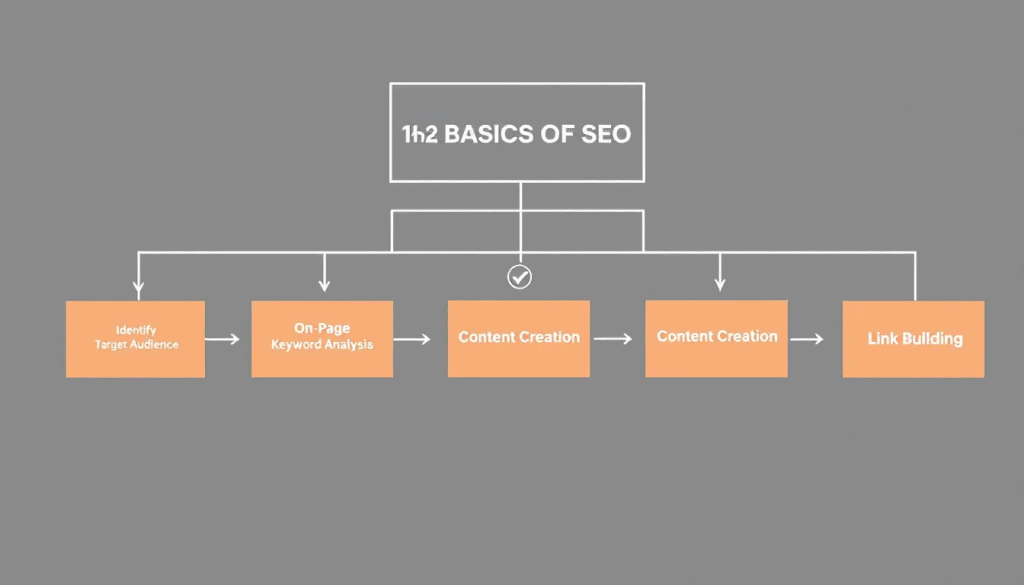
Optimizing a website for better visibility and ranking within search engines is the crux of Search Engine Optimization (SEO). This process transcends mere keyword insertion across your page, requiring an in-depth comprehension of audience tendencies, their likes and dislikes, as well as the operational mechanisms behind search engines. Utilizing Google Analytics to dissect how keywords fare allows marketers to shape their approaches using empirical evidence.
Central components of SEO include conducting thorough keyword research, producing content that meets high-quality standards, and applying on-page optimization strategies. These efforts are aimed at enhancing the discoverability of websites by search engines like Google while catering to specific audience searches.
Keyword Research Essentials
Conducting thorough keyword research is essential in sculpting a successful SEO strategy, as it helps pinpoint the precise keywords that resonate with both your content and website. By targeting these specific keywords, companies can surpass their rivals in search engine rankings and attract substantial traffic. Tools such as Google Analytics and Google Keyword Planner are invaluable for gleaning keyword data that can sharpen an SEO approach. Neglecting this crucial step may result in content failing to reach its intended audience.
Likewise, crafting effective paid search advertisements hinges on choosing pertinent keywords that reflect the intentions of your target market’s searches. Grasping what prospective customers are searching for enables you to generate content tailored to satisfy their requirements, leading to better positioning within search engine results pages (SERPs). This requires analyzing competitor tactics, staying abreast of evolving search trends, and periodically refreshing your list of keywords so as not just keep pace with but excel amidst ongoing competition changes.
Crafting High Quality Content
High-quality website content is essential in SEO as it attracts users and signals value to search engines. Unique, useful, and regularly updated content based on expert knowledge can significantly enhance user engagement and retention. Maintaining original content is vital for the integrity and reliability of your website. When your audience finds your content engaging, they are more likely to stay on your site longer, reducing bounce rates and improving overall SEO performance.
Developing high-quality content involves understanding your audience’s needs and interests, and delivering information that is both relevant and valuable to them. Incorporating elements like a hero image can also make your content more visually appealing and engaging.
The goal is to captivate your audience by delivering the information they seek.
On-Page Optimization Techniques
On-page SEO involves strategies to boost visibility in search engine results and elevate the user experience. Optimizing meta tags, such as title tags and meta descriptions, is essential for enhancing click-through rates by delivering a succinct and accurate summary of your page content.
Implementing proper header tags (H1 through H3) organizes your content effectively, aiding search engines in recognizing the structure and importance of your site’s information. Creating internal links within articles not only facilitates easier navigation, but also distributes link equity across your site, which can significantly improve its overall SEO standing.
Elevating site speed and ensuring that your website functions well on mobile devices are crucial aspects of on-page optimization efforts. These practices jointly lead to superior search engine rankings while providing a more amenable experience for users.
Paid Search Advertising Simplified
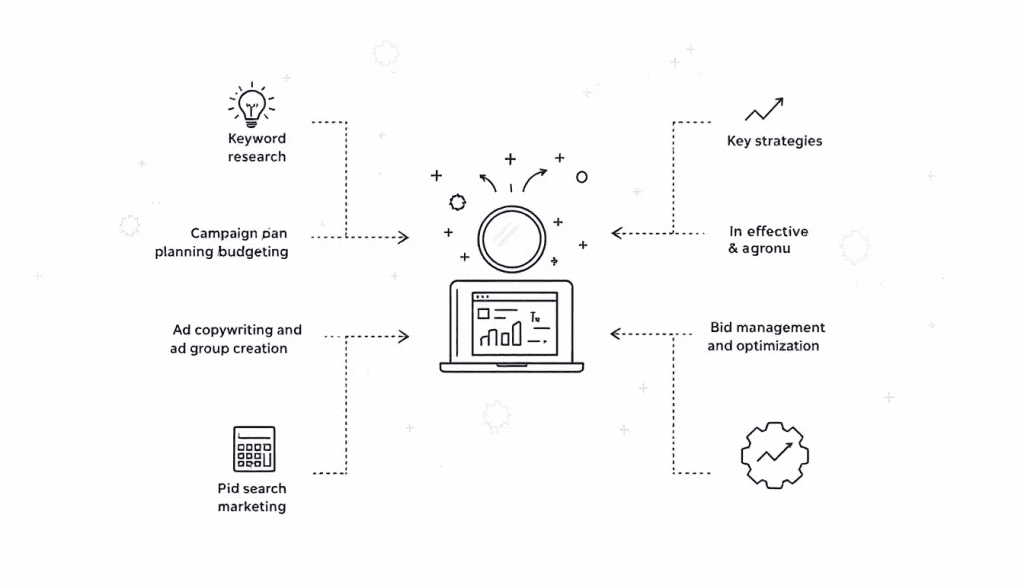
Paid search advertising is a strategy aimed at achieving immediate results through carefully placed ads that are displayed prominently in search engine results. This method allows companies to connect with potential clients who are actively looking for the products or services they offer. Crafting a successful Google Search. Ads relies on employing strategic targeting with various match types, making it flexible enough to support anything from expansive corporate initiatives to single product introductions.
To increase the precision of paid search campaigns, incorporating negative keywords ensures your ads don’t appear in response to unrelated searches, thus boosting campaign efficiency. Localizing campaigns according to geography, language preferences and scheduling can lead to enhanced outcomes while also streamlining expenditure.
It’s critical for businesses engaging in PPC (pay per click) advertising and managing Google AdWords initiatives to grasp fundamental principles fully for effective setup and execution of their ad campaigns.
Introduction to Pay Per Click (PPC)
PPC advertising entails purchasing ads that are paid for each click. Advertisers pay for each click on their ads, up to their maximum bid, in this model. The main focus of PPC is to get traffic from paid search, social, and display. Paid advertising search marketing operates by allowing advertisers to select specific search terms for their ads, incurring a cost per click.
Google determines which ads are shown on search results pages based on several factors that evaluate ad quality and relevance. Advertisers can control ads showing using match types, such as phrase match and exact match.
AI can help refine ad targeting by analyzing audience behavior and preferences, enhancing the effectiveness of PPC campaigns. Tools like Ahrefs can be used to analyze competitors’ paid search strategies, offering insights into keywords, ads, and landing pages.
Setting Up Google AdWords Campaigns
Advertisers have the capability to tailor ads and orchestrate campaigns automatically on the Google Ads platform. Campaigns can be effectively organized by centering them around themes or clusters of keywords. To simplify the management of numerous keywords, employing tools like ChatGPT for theme creation is beneficial. This alignment between campaign structure and keyword groups optimizes ad performance, leading to higher quality advertisements.
Ensuring that ads correspond with designated keyword themes bolsters their pertinence and effectiveness. Adopting this methodical strategy not only enhances ad positioning but also aids in efficiently handling and refining campaigns on a grand scale.
Budget Management Tips
In paid search advertising, it’s crucial to establish a daily budget for your campaigns and continuously oversee the spending. To optimize your investment in paid search efforts and achieve maximum ROI, effective management of this budget is essential. This involves vigilant tracking and fine-tuning to secure optimal returns while preventing any unnecessary expenditure, thereby optimizing performance outcomes.
Best Practices in Search Marketing
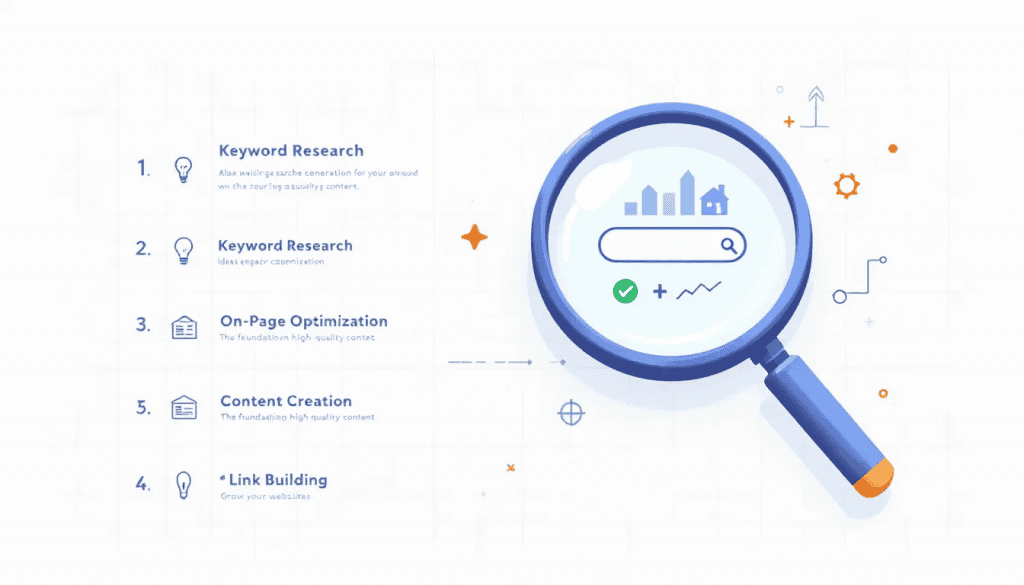
Employing the most effective tactics can significantly boost the impact of search marketing efforts. By structuring campaigns around themes based on keywords, both ad relevance and performance are improved. Tools such as Google Analytics play a crucial role in monitoring various indicators like sources of traffic and patterns of user behavior, which helps sharpen overall marketing approaches. With custom dashboards in Google Analytics, marketers are able to concentrate on data points that directly align with their unique goals.
Applying advanced segments within Google Analytics yields more profound understanding regarding particular groups of users or specific marketing initiatives. Through an ongoing process of examining analytics data and refining techniques, companies can gain an advantage over rivals and optimize their strategies for market searches.Recommended best practices include maintaining uniformity in messaging across platforms, adopting artificial intelligence for crafting ads copywriting, and engaging in constant optimization cycles to enhance outcomes progressively.Consistent Messaging Across PlatformsConsistent messaging in search marketing enhances user experience and increases conversion rates. Google checks if the ads match the landing pages as part of its relevance assessment. This relevance is gauged through Google’s Quality Score, which influences ad placement and cost.Uniform messaging across all platforms helps build brand identity and trust. When users encounter consistent messages, they are more likely to engage and convert, improving the overall effectiveness of your marketing efforts.Leveraging AI for Ad CopyAI technology is instrumental for marketers when it comes to quickly producing early ideas for ad copy. By employing AI, they can improve the relevance of keywords in their ads, making sure that these are more accurately matched with what users are searching for. Automation and content optimization in advertising today owe a lot to AI’s ability to streamline complex tasks.The use of AI guarantees that tailored messages reach the intended target audience with precision. It achieves this by evaluating data about the audience and customizing ad copy that connects meaningfully with various demographic groups, thereby enhancing both user engagement and conversion rates.Iterative Optimization ApproachIt’s advisable to employ an iterative strategy in search engine marketing, which supports ongoing testing and optimization, thereby boosting the efficacy of campaigns. Initially holding back from spending the entire budget upon campaign launch provides leeway for making essential adjustments informed by performance data.Employing a strategy that embraces iterative optimization can lead to enhanced outcomes and greater investment returns within search marketing. Through relentless experimentation and fine-tuning of campaigns, businesses gain the flexibility to respond effectively to evolving market dynamics while amplifying their overall marketing achievements.Integrating Mobile Optimization
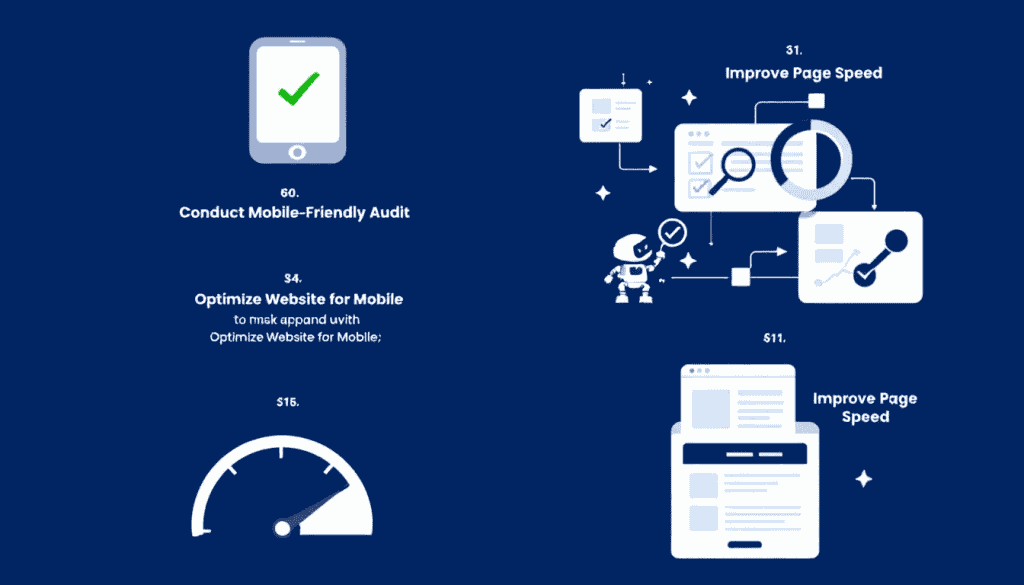
Due to the predominance of mobile usage and Google’s shift towards mobile-first indexing, it is essential for websites to be compatible with mobile devices. Starting from July 5th, 2024, Google intends not to index any site that fails on this front. As more people use their smartphones over desktops for internet access and abandon websites with substandard mobile functionality, transitioning toward a design that prioritizes mobile has become imperative.
By optimizing your website for the convenience of smartphone users, you can boost conversion rates thanks to an enhanced browsing experience suitable for on-the-go visitors. Proper SEO tactics also involve crafting URLs that clearly convey page contents both to individuals using search engines as well as those engines themselves. The deployment of Accelerated Mobile Pages (AMP) can significantly speed up loading times for web pages viewed on phones. This acceleration fosters better engagement from visitors and makes the site more prominent in search results.To secure top positions within search engine results consistently, it’s important to produce content regularly which is fresh and pertinent. By giving precedence to optimization tailored specifically toward smartphones and tablets, your site caters effectively to a wider audience—thereby drawing increased traffic—and elevates its overall performance metrics.Fine-Tuning Your Strategy with AnalyticsTracking metrics like impressions, click-through rates, and sales revenue is key to assessing the effectiveness of advertisements. It’s crucial for businesses to monitor their return on investment in order to tweak budgets and strategies for improved campaign performance. Ongoing testing and analysis of data play a pivotal role in the gradual enhancement of ad efficiency.Analyzing data is imperative when pinpointing which aspects of a marketing campaign are yielding the best results. Marketers can employ an iterative approach that enables constant experimentation and refinement based upon observed outcomes and feedback received. Utilizing tools such as Google Analytics provides companies with deep insights into their target audience, assisting them in honing their marketing tactics more precisely.Elevate Your Search Marketing Strategy: Key Insights and Actionable StepsTo excel in the realm of straightforward search marketing, one needs to grasp SEO fundamentals, establish efficient paid search initiatives, and constantly refine tactics through analytics. Emphasizing keyword research and crafting top-notch content alongside on-page optimization efforts and uniform messaging can help enterprises elevate their rankings on search engines and attract increased traffic to their sites.It’s vital for businesses to adapt by optimizing for mobile devices as well as utilizing artificial intelligence for generating advertising copy—key measures that bolster your approach to search marketing. A defined strategy paired with dedicated commitment towards progressive enhancement enables companies not only to attain remarkable outcomes but also maintain a competitive edge within the bustling digital market arena.Frequently Asked QuestionsWhy is search marketing important for my business?Marketing through search is vital for increasing your online presence, drawing traffic to your website, and substantially elevating the potential for sales.How can I improve my search engine rankings?To enhance your search engine rankings, focus on optimizing your website with relevant keywords, creating high-quality content, and implementing strong on-page SEO strategies.This approach will help you attract more organic traffic and improve visibility online.What is the difference between organic traffic and paid search traffic?Organic traffic comes from unpaid search results, while paid search traffic stems from advertisements for which you pay to increase visibility on search engines.How do I set up a Google AdWords campaign?To effectively initiate a Google AdWords campaign, structure your advertisements around distinct themes related to keywords and tailor them in a manner that appeals directly to your intended audience. Make use of keyword management tools for optimal effectiveness.Adopting this organized strategy will significantly boost the performance of your advertising campaign.Why is mobile optimization important?Mobile optimization is crucial as it enhances user experience for the majority of web visitors using mobile devices and improves search engine visibility.Prioritizing mobile-friendly design can significantly impact your site’s performance and reach.
